How to Treat Insomnia with CBD: 5 Proven Strategies for Restful Nights
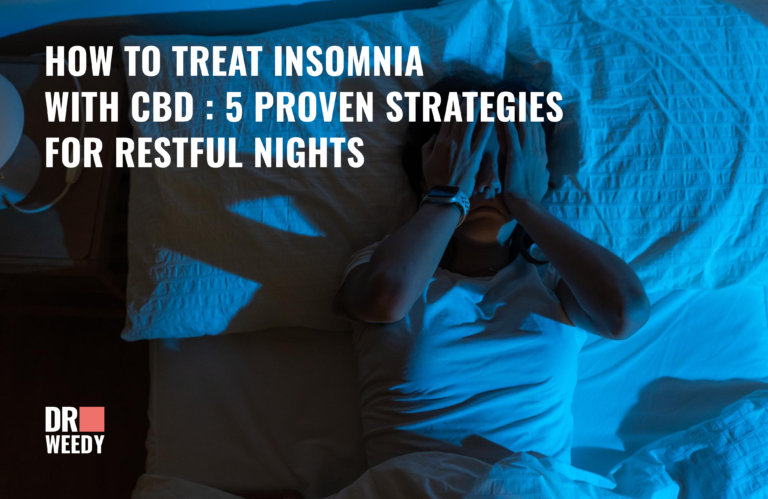
Not getting enough sleep can be a real bummer. From feeling groggy in the morning to struggling to concentrate during the day, the effects of insomnia can be far-reaching. In this article, we’re going to introduce you to a natural solution that could help you finally get the restful nights you’ve been dreaming of – CBD. I’ll walk you through five proven strategies for treating insomnia with CBD and leave you feeling refreshed and ready to tackle whatever comes your way. By the time you are done reading this article, you will know how to use CBD to improve your sleep quality. You will also learn about the different ways to take CBD, the best dosage for sleep, and how to make the most of its benefits. So, if you’re ready to say goodbye to sleepless nights, keep reading!
Can CBD Help with Insomnia?

Many people have found relief and help in the use of CBD in managing different health conditions. Today, CBD is used to treat and manage a range of clinical conditions including pain, seizures, anxiety, inflammation, and insomnia, amongst others.
Obtained from marijuana, CBD is a non-psychoactive cannabinoid largely believed to be behind most medicinal effects of marijuana. Although there is not much research specifically on how CBD is able to help with insomnia, anecdotal evidence suggests it actually helps. It is worth noting that a 2022 systematic review investigating the use of Cannabidiol (CBD) in managing insomnia found that out of 34 studies, all reported improvement in insomnia symptoms in at least some participants, with promising outcomes for both CBD-predominant therapy and nearly equal ratios of CBD to Δ9-tetrahydrocannabinol (THC).
Can CBD Cause Sedation?
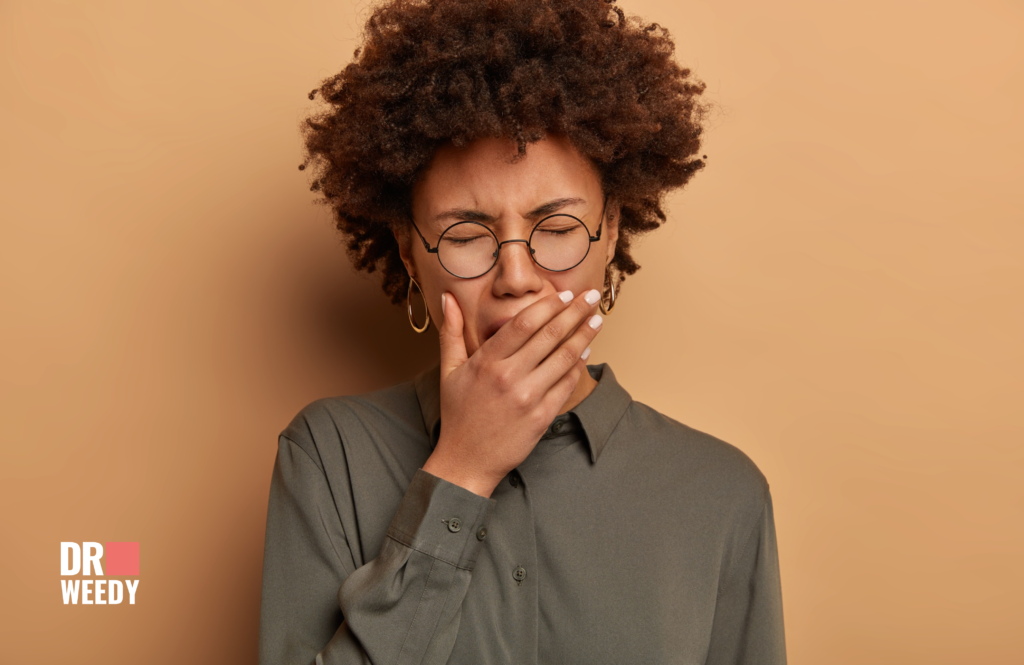
At the moment, a lot is not known about how CBD is able to cause sleep. Nevertheless, the ability of CBD to induce sedation is believed to be dose-dependent. Low doses have been found to be more stimulating, while higher doses have a sedating effect. This implies that the more CBD consumed, the more the likelihood of inducing sedation(Disclaimer: This is not a dosage prescription or recommendation). This is supported by studies that inferred that a higher dose of CBD is therapeutic for insomnia. Studies by Nicholson and Zuardi et al, also showed that high CBD dose increases sleep time and decreases nightly arousals in people with insomnia.
How Does CBD Treat Insomnia?
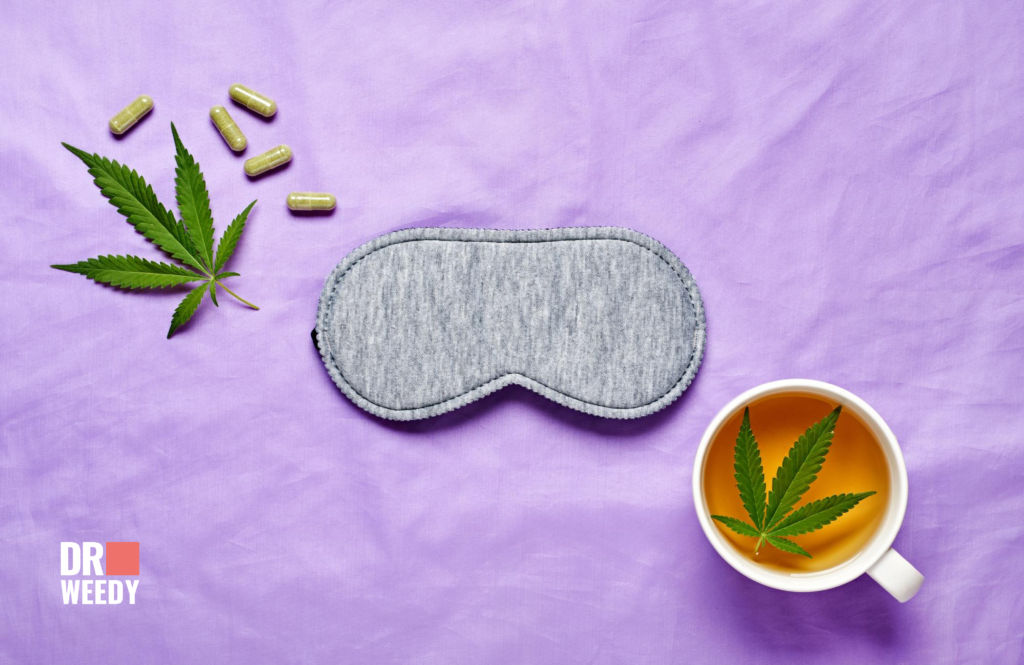
Ever heard of the endocannabinoid system (ECS)? It is a complex network of receptors and enzymes found throughout the body with a range of physiological control functions including sleep. It is believed that CBD interacts with the endocannabinoid system to regulate sleep-wake cycles and improve sleep.
Due to limited studies on the subject, not much is known. Nevertheless, studies suggest that CBD may promote sleep by:
- Reducing anxiety and stress: Being common contributors to insomnia, CBD’s anxiolytic and stress-reducing properties can help ease these concerns and promote relaxation, making it easier to fall asleep and stay asleep.
- Enhancing melatonin production: Melatonin is a hormone that regulates sleep-wake cycles. CBD may help the body produce more melatonin, contributing to better sleep quality.
- Reducing inflammation: Inflammation can disrupt sleep patterns. CBD’s anti-inflammatory properties may help reduce inflammation and promote restful sleep.
5-Step Guide to Using CBD for Insomnia Relief
1. Choose the Right CBD Product: Which CBD Product is Better for Treating Insomnia?
With varying forms to suit individual needs, CBD products come in three main categories: full-spectrum (containing all cannabis plant components, including up to 0.3% THC), broad-spectrum (containing all plant components except THC), and CBD isolate (pure CBD). Read this guide for more clarity.
Each category offers a unique experience. Full-spectrum CBD oil, with its entourage effect, is preferred by some due to its wide range of cannabinoids, terpenes, and flavonoids. However, the experience varies. To maximize benefits, choose the form that best suits your system. CBD products also come in gummies, vapes, tinctures, and topicals. Not all CBD products are equal. Ensure your product is third-party tested for guaranteed quality and purity, regardless of your preference.
Table: Types of CBD Products for Insomnia
| Product Type | Description | Advantages | Disadvantages |
|---|---|---|---|
| CBD Oil | Tinctures, capsules, edibles | Convenient, easy to use, can be tailored to individual needs | May be pricey |
| CBD Gummies | Edibles in the form of gummies | Convenient, tasty, easy to dose | May be pricey |
| CBD Topicals | Creams, lotions, salves | Can be applied directly to the skin, and may help with pain | May not be as effective as other forms of CBD for insomnia |
2. Take the Right Dosage
The effectiveness of CBD for insomnia lies in the correct dosage. Finding the right CBD dosage for insomnia can be a trial-and-error process. You should start with a low dose and gradually increase it until you find what works for you. Nevertheless, consulting with a healthcare professional is advisable, especially if you are new to CBD or are taking other medications.
How much CBD oil should I take to help with insomnia?
The best CBD dosage for insomnia will vary depending on individual factors such as weight, metabolism, and severity of insomnia. However, a good starting point is 25-50 mg of CBD per day. You can gradually increase the dosage as needed until you find what works best for you.
3. Incorporate CBD into Your Bedtime
To enhance sleep, consider taking CBD about 30 minutes before bedtime, allowing the compound to absorb and interact with your endocannabinoid system as you prepare for sleep. At this time, you can also engage in activities that promote relaxation, such as reading a book, taking a warm bath, or practicing mindfulness. The combination of CBD and a calming routine can significantly improve sleep quality. Remember, consistency is crucial, so take your chosen dose at the same time each night.
4. Fix The Underlying Factors to Improve Sleep
While CBD can be a powerful elixir in the fight against insomnia, it is crucial to address any underlying factors that may be contributing to your sleep disturbances. Generally, anxiety, poor sleep habits, and stress are common causes of insomnia. As you address these issues, you create a more conducive environment for sleep and make CBD more effective.
In the words of Charles W, MD, “Worry and stress affects the circulation, the heart, the glands, the whole nervous system, and profoundly affects heart action.” Therefore, making lifestyle changes is essential to improve your sleep quality. Regular exercise, a healthy diet, and avoiding caffeine and alcohol before bed can all help to promote relaxation and restful sleep. Additionally, establishing a regular sleep schedule and creating a relaxing bedtime routine can help train your body to fall asleep and wake up at the same time each day.
5. Improve Sleep Hygiene
According to the Sleep Foundation, “A strong sleep hygiene means having both a bedroom environment and daily routines that promote consistent, uninterrupted sleep…” This simply implies that as you start taking CBD for insomnia, creating a sleep-conducive environment is essential for good sleep. Make sure your bedroom is dark, quiet, and cool. Avoid using electronic devices in bed, as the blue light emitted from screens can interfere with sleep. Additionally, use your bed only for sleeping and avoid napping during the day, as this can disrupt your sleep schedule.
While CBD alone can help remedy sleepless nights, microdosing THC can also be helpful.
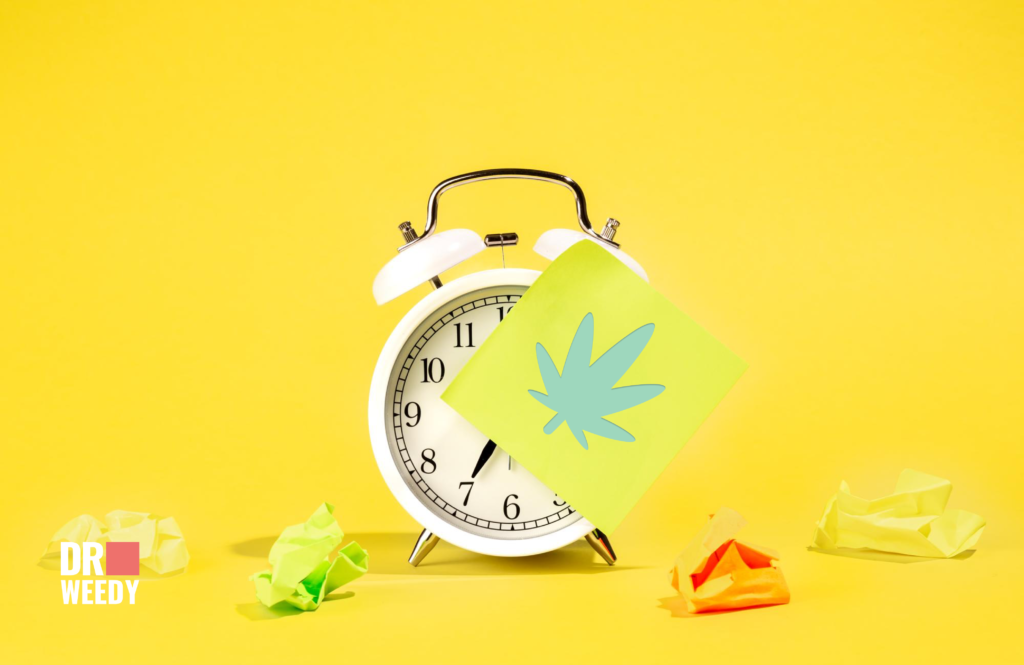
Microdosing THC for Insomnia
Microdosing THC for sleep can improve your quality of sleep. Although THC is the chemical responsible for the psychoactive effects of marijuana, you need not worry about its mind-altering effects if you microdose THC properly. Microdosing involves taking small doses of medical marijuana that are not potent enough to cause any of the unwanted effects, but just enough to give you the desired therapeutic effect.
Research has found that at low doses, THC can help individuals fall asleep faster, stay asleep
longer, and improve the overall quality of sleep.
How to Microdose THC for Better Sleep
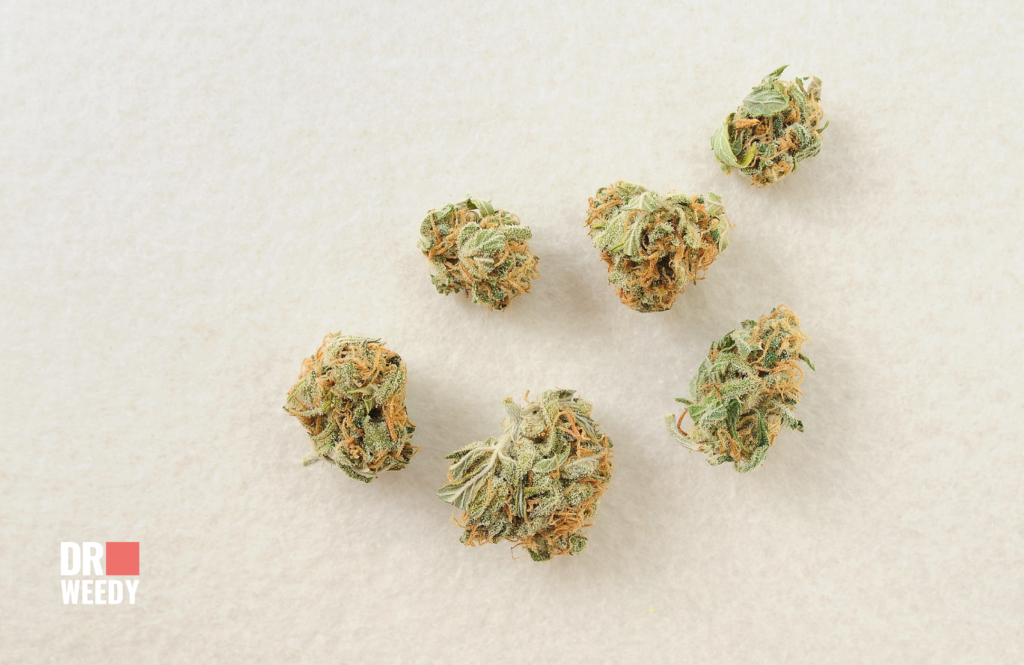
THC interacts with the endocannabinoid system to improve sleep quality. However, this interaction is not the same for everyone. Given this variability in individual response, starting with a low dose of 1mg is best. From there, you can gradually increase until you find that perfect quantity that gives you the good night you have been searching for.
Frequently Asked Questions
Should I take CBD oil before bed or earlier in the day?
CBD oil can be taken at any time of day, but as a remedy for insomnia, it is best taken before bed.
Will CBD oil make me high?
No, CBD oil will not make you high. This is because CBD is a non-psychoactive compound, meaning it does not have the ability to alter your mind or perception.
Are there any side effects to taking CBD oil for insomnia?
CBD oil is generally considered to be safe and well-tolerated. However, some people may experience mild side effects such as dry mouth, drowsiness, and diarrhea. If you experience any side effects, talk to your doctor.
How long does it take for CBD oil to work for insomnia?
Some people experience relief from insomnia immediately after taking CBD oil, while others may find that it takes a few weeks to see results. The amount of time it takes for CBD oil to work for insomnia will vary depending on individual factors.
Can CBD oil cause insomnia?
In some people, CBD oil may cause insomnia. This is because CBD is biphasic, meaning that it can have different effects depending on the dosage.
Final Thoughts
CBD presents a promising natural solution for those struggling with insomnia. By incorporating your preferred CBD product into your sleep routine, you may experience the transformative power of restful nights and enjoy the rejuvenating benefits of a well-rested mind and body. However, before embarking on a CBD regimen for insomnia, it is crucial to consult with your doctor for proper guidance and ensure that CBD is compatible with your current medications.
As always, it is best to adopt a holistic approach to sleep management. Remember, a good night’s sleep is essential for overall health and well-being. Embrace the restorative power of CBD and take charge of your sleep. Stay healthy and well-rested!
Sorces:
- Ranum RM, Whipple MO, Croghan I, Bauer B, Toussaint LL, Vincent A. Use of Cannabidiol in the Management of Insomnia: A Systematic Review. Cannabis Cannabinoid Res. 2023 Apr;8(2):213-229. doi: 10.1089/can.2022.0122. Epub 2022 Sep 23. PMID: 36149724.
- Shannon S, Lewis N, Lee H, Hughes S. Cannabidiol in Anxiety and Sleep: A Large Case Series. Perm J. 2019;23:18-041. doi: 10.7812/TPP/18-041. PMID: 30624194; PMCID: PMC6326553.
- Vaillancourt, R., Gallagher, S., Cameron, J. D., & Dhalla, R. (2022). Cannabis use in patients with insomnia and sleep disorders: Retrospective chart review. Canadian Pharmacists Journal : CPJ, 155(3), 175-180. https://doi.org/10.1177/17151635221089617
- Zhornitsky S, Potvin S. Cannabidiol in humans—the quest for therapeutic targets. Pharmaceuticals (Basel) 2012 May 21;5(5):529–52. doi: 10.3390/ph5050529. [PMC free article] [PubMed] [CrossRef] [Google Scholar]
- Zuardi AW, Guimarães FS, Moreira AC. Effect of cannabidiol on plasma prolactin, growth hormone and cortisol in human volunteers. Braz J Med Biol Res. 1993 Feb;26(2):213-7. PMID: 8257923.


























Maintaining a regular sleep schedule is highly beneficial but might not be so easy to incorporate into your daily life. However, with the help of CBD, you might start to notice that some of those sleep issues start to disappear.